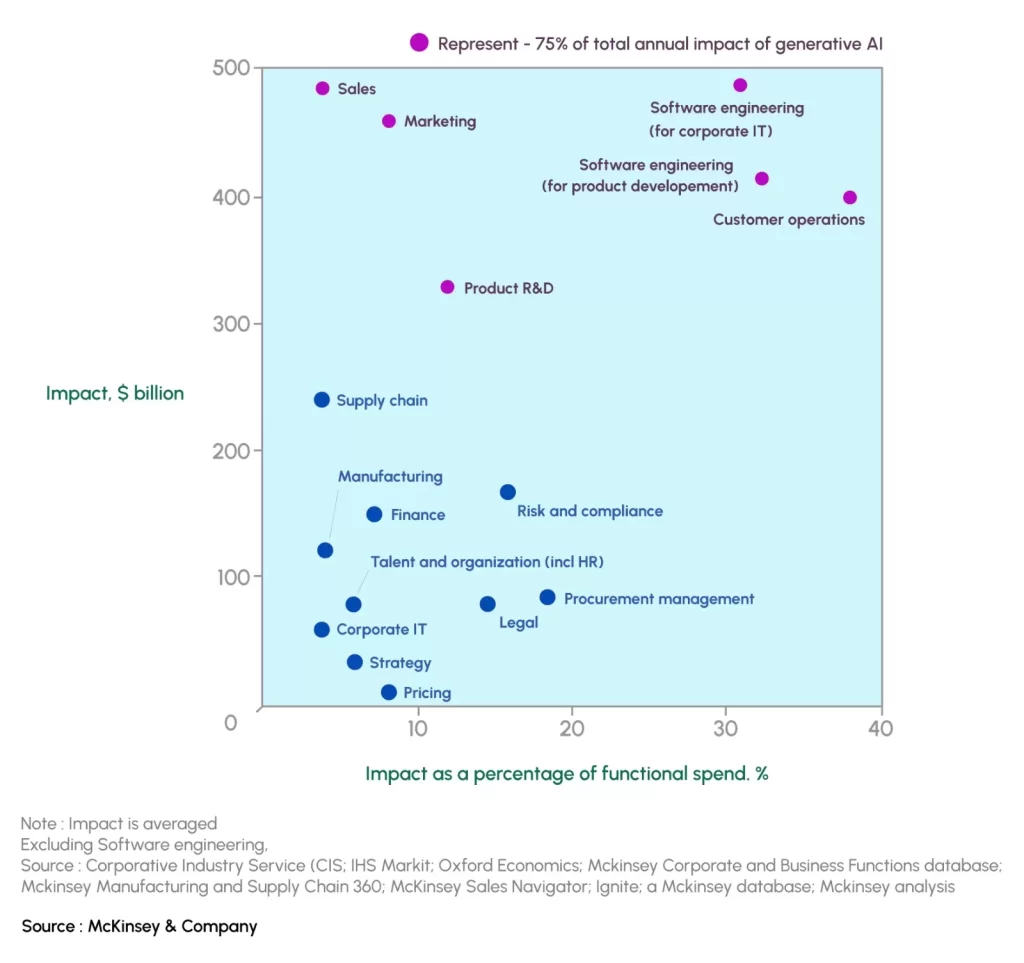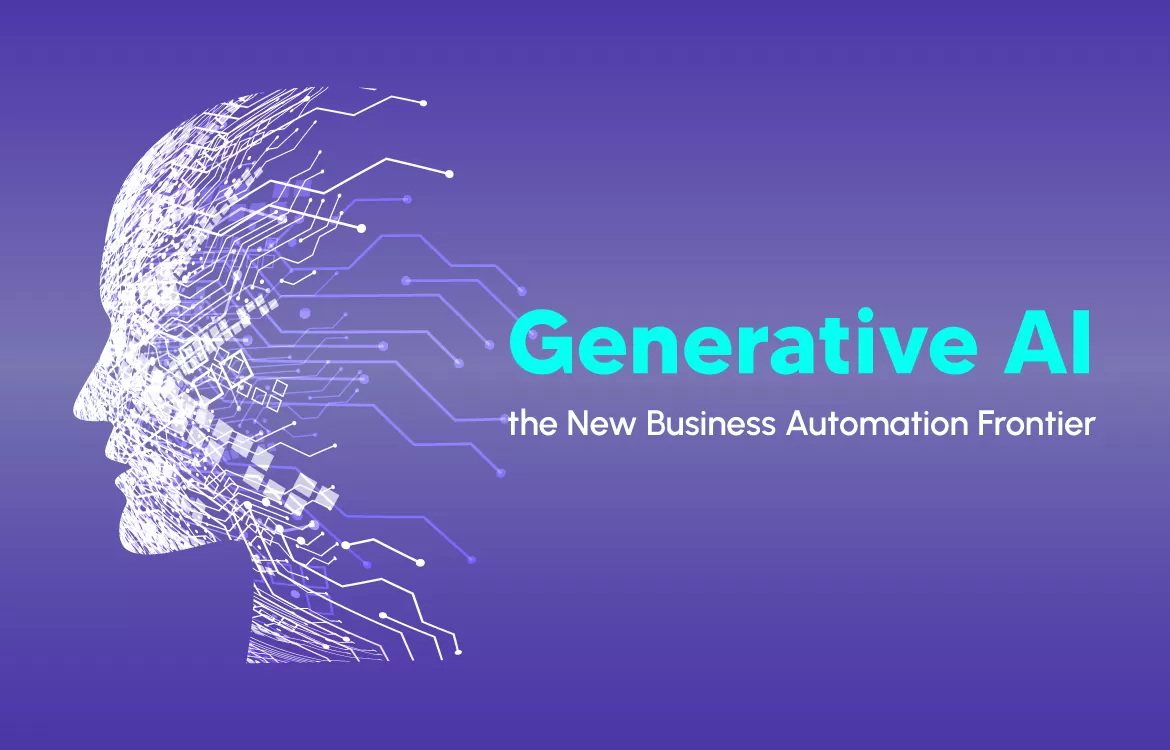Generative AI, powered by advanced models like GPT-3 and its successors, is set to transform business operations across numerous industries. Previously, we believed certain skills, such as coding, content creation, and music composition, were uniquely human. Generative AI is now on the brink of triggering a new era of productivity. Despite being a relatively recent innovation, we are just beginning to comprehend its full potential, with exciting new applications emerging regularly.
As generative AI becomes more integrated into business processes, its impact will be profound and far-reaching. This article examines the fundamental principles of generative AI, explores its practical applications across various sectors, and presents real-world use cases, along with statistics that underscore its transformative potential.
What is Generative AI?
So, how does Generative AI differ from conventional AI?
The core of generative AI technology lies in its ability to produce realistic new data. Traditional AI techniques like rule-based systems or classical machine learning algorithms primarily identify and interpret existing patterns but do not generate new data inherently.
GANs, a prominent example of generative AI, consist of two neural networks: the generator and the discriminator. These networks engage in adversarial training, where the generator aims to create realistic data, and the discriminator strives to identify real versus generated data. This adversarial interaction results in the generation of high-quality, lifelike data, a capability not found in earlier AI methodologies.
What are the applications of Generative AI?
Why Generative AI Matters for Business
Our early experience with Generative AI featured chat interfaces that responded like an intelligent, enthusiastic friend in everyday language. For businesses, conversational AI assistants remain pivotal, functioning like human workers but with real-time access to updated information and resources.
Around 75% of generative AI’s value is expected in customer operations, marketing and sales, software engineering, and R&D. New applications will streamline tasks like creating presentations and marketing materials, reducing time and resource investment.
By 2025, Gartner predicts 50% of data science tasks will be automated through AI.
Benefits:
Personalization: Offers tailored recommendations and marketing messages, boosting customer satisfaction and conversion rates.
Efficient Customer Support: Advanced chatbots provide 24/7 support, cutting costs and improving satisfaction.
Innovative Product Design: Assists in creating prototypes and optimizing designs in fashion and automotive industries
Data-Driven Decision-Making: Enhances market research, trend analysis, and decision-making through data analysis.

Generative AI Use Cases
Advanced AI technology is poised to revolutionize operations across various industries. AI development companies, like iTech, are now focusing on incorporating this cutting-edge technology into more of their projects.
1. Healthcare and Generative AI Applications
Generative AI in healthcare uses deep learning techniques like GANs to create patient-specific treatment plans by analyzing medical histories, genetic information, and real-time health data. NLP models like Transformer architecture can automate medical report generation.
Benefits: Personalized healthcare, improved diagnostic accuracy, enhanced patient outcomes, and support for drug discovery.
2. Increased Personalization with Generative AI in Retail
Generative AI in retail employs machine learning and reinforcement learning to analyze consumer behavior, adjusting inventory management, pricing, and recommendations in real-time.
This technology can boost productivity, increase annual revenue by 1.2 to 2.0 percent, provide detailed product information, and enhance customer support through advanced chatbots, freeing up staff for other tasks.
3. Finance – AI Consultancy Services
Generative AI for finance uses sophisticated algorithms for risk assessment, fraud detection, and compliance. Already benefiting areas like marketing and customer operations, generative AI is set to further improve text-based data analysis and serve B2C and small-business customers.
Benefits: Enhanced risk management, fraud detection, regulatory compliance, and customer service.
4. Marketing and Advertising: Prime for Generative AI Applications
Generative AI integrates with big data analytics, using reinforcement learning to optimize ad campaigns and NLG models for automated content creation.
Benefits: Targeted advertising, improved ROI, streamlined content creation, and real-time adaptation to consumer behavior and market trends.
5. Logistics Industry: Generative AI’s Operational Impact
Generative AI leverages models like GANs and VAEs to create synthetic logistics data, enhancing AI training and performance. It offers novel solutions for route optimization, inventory management, and maintenance schedules.
Benefits include creative problem-solving in logistics, advanced chatbots, and virtual assistants for better customer service.
Finally…
While generative AI offers significant potential, businesses must approach it with clear guidelines. Transparent, ethical AI policies are essential, especially in regulated industries like healthcare and finance, to prevent misinformation and biases that could impact data accuracy and trust.
Is your organization aiming to leverage the transformative capabilities of Generative AI in your operations? Partner with a trusted Generative AI company like iTech. Our team of experts excels in deploying cutting-edge AI solutions and can assist you in unlocking the full potential of Generative AI, tailored to your unique business requirements.





